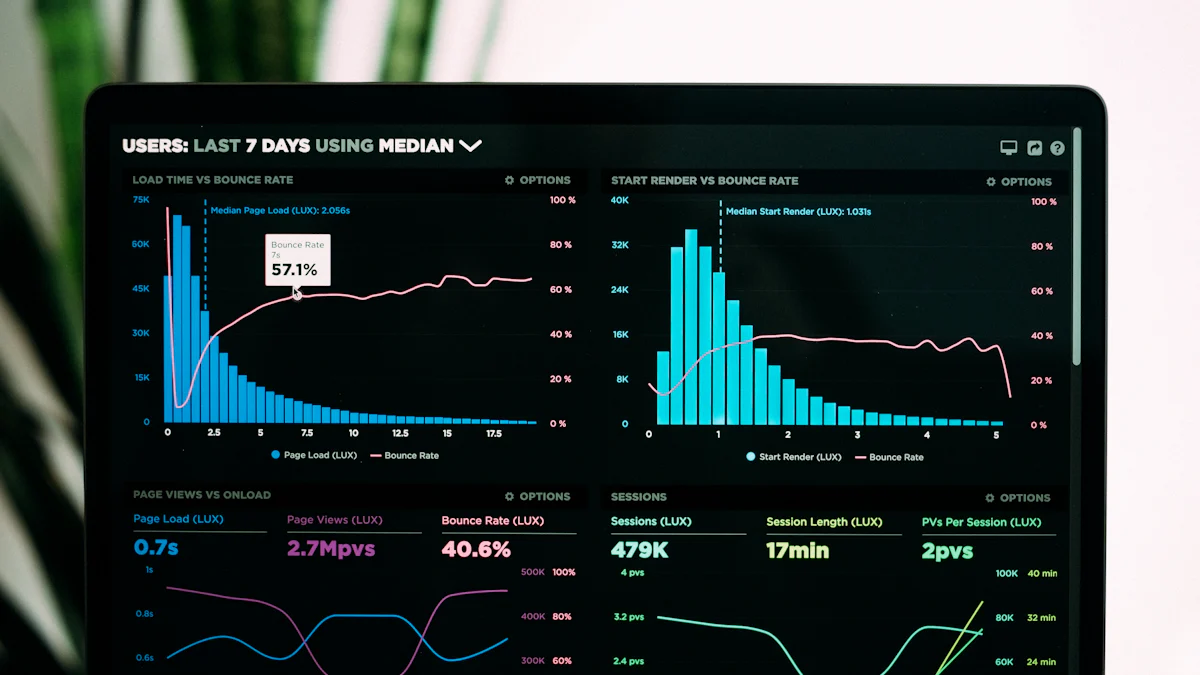Solving Performance Issues in BI Ad-Hoc Queries

BI ad-hoc queries play a pivotal role in decision-making processes. Quick access to data allows businesses to make informed decisions. However, performance challenges often arise. Slow BI ad-hoc query response times can hinder analytics and delay critical decisions. For instance, Clickhouse's response time for multi-dimensional aggregation can exceed 60 seconds, impacting user experience. Performance issues in BI ad-hoc queries can disrupt business operations. Efficient BI ad-hoc query performance is essential for timely decision-making and resource optimization.
Understanding Performance Issues in BI Ad-Hoc Queries

Identifying Common Performance Bottlenecks in BI Ad-Hoc Queries
BI ad-hoc query performance often suffers due to several common bottlenecks. One primary issue involves inefficient data retrieval methods. Poorly designed queries can lead to excessive CPU utilization, causing delays. Analyzing CPU utilization by BI queries helps identify these inefficiencies. High CPU usage indicates that queries need optimization.
Another common bottleneck is the parameter sniffing problem. This occurs when SQL Server caches a query plan based on specific parameter values. Subsequent executions with different parameters may perform poorly.
Overuse of ad-hoc queries also leads to high memory usage. BI ad-hoc queries often lack cached query plans, unlike stored procedures. This results in repeated compilation and execution, consuming more resources.
Scalability issues arise as businesses grow. Embedded reporting systems struggle to handle increasing ad-hoc query workloads. Hadoop-based BI workloads, for example, range from short to complex queries. Efficient data management techniques can alleviate these scalability concerns.
Measuring BI Ad-Hoc Query Performance
Measuring BI ad-hoc query performance requires tracking key performance indicators (KPIs) and metrics. Monitoring response times provides insights into query efficiency. Tools like SQL Monitor offer valuable data on query execution times and resource usage.
Tracking business operations success involves assessing product performance through KPIs. Efficient calculation of metrics, such as page views and unique visitors, improves overall performance. Optimizing DAX measures ensures accurate and timely metric calculations.
Resource utilization metrics play a crucial role in performance measurement. Analyzing CPU and memory usage helps identify areas for improvement. Achieving cost and resource optimization requires continuous monitoring and adjustment of BI ad-hoc queries.
Effective performance measurement also includes user experience assessment. Slow query responses negatively impact analytics users. Ensuring quick access to data enhances decision-making processes. Regular performance evaluations ensure that BI ad-hoc queries meet business needs.
Strategies for Improving BI Ad-Hoc Query Performance

Data Management Techniques
Effective data management techniques can significantly enhance BI ad-hoc query performance. Proper indexing of data tables ensures faster retrieval times. Indexing allows the query engine to locate data quickly, reducing response times. Partitioning large datasets also improves performance. Dividing data into smaller, manageable segments enables efficient querying.
Data compression techniques reduce storage requirements and improve query speed. Compressed data occupies less space, allowing faster access. Regular data maintenance, such as removing obsolete records, keeps databases optimized. Clean and well-organized data structures facilitate quicker query execution.
Expert Testimony:
"Optimizing Performance: Knowing if a query is ad hoc can help identify potential performance bottlenecks. Ad hoc queries may not benefit from pre-compiled execution plans, potentially impacting their speed."
Query Optimization Techniques
Query optimization techniques play a crucial role in enhancing BI ad-hoc query performance. Simplifying complex queries reduces execution time. Breaking down intricate queries into simpler sub-queries improves efficiency. Using appropriate SQL functions and avoiding unnecessary calculations speeds up query processing.
Parameter sniffing problems often degrade performance. Implementing SQL parameters mitigates this issue. Parameters allow the procedure cache to store and reuse query statements effectively. This reduces the need for repeated compilation and execution.
Expert Testimony:
"In my experience BI query performance matters because usually BI provides insights for a better decision for managers/directors and their time are crucial, so they can´t wait for data to take a decision, worst than this take a wrong decision because data not loaded properly."
Utilizing query hints guides the database engine in executing queries more efficiently. Hints provide specific instructions on how to process queries. Monitoring and analyzing query execution plans help identify inefficiencies. Adjusting queries based on these analyses enhances performance.
Infrastructure Enhancements
Infrastructure enhancements significantly impact BI ad-hoc query performance. Upgrading hardware components, such as CPUs and memory, boosts processing power. High-performance servers handle complex queries more efficiently. Utilizing solid-state drives (SSDs) instead of traditional hard drives accelerates data access speeds.
Implementing distributed computing environments, like Hadoop or Spark, manages large-scale data processing. Distributed systems divide workloads across multiple nodes, improving query performance. Cloud-based solutions offer scalable resources, adapting to varying workloads. Cloud infrastructure provides flexibility and cost-efficiency for BI ad-hoc queries.
Network optimization ensures quick data transfer between servers and clients. Reducing network latency minimizes delays in query responses. Load balancing distributes query workloads evenly across servers, preventing bottlenecks. Ensuring robust and reliable network connections enhances overall performance.
Case Studies and Examples
Real-World Examples of Performance Improvement
Atlas: Enhancing BI Query Performance
Atlas, a leading global logistics company, faced significant challenges with BI ad-hoc query performance. The company experienced slow query response times, which hindered decision-making processes. Atlas needed a solution to improve query efficiency and support rapid business growth.
Identifying Performance Bottlenecks:
Atlas conducted an in-depth analysis of query execution times and data transfer rates.
The team identified resource-intensive queries that consumed excessive CPU and memory.
Implementing Data Management Techniques:
Atlas optimized data tables by implementing proper indexing and partitioning strategies.
Data compression techniques reduced storage requirements, allowing faster data access.
Optimizing Queries:
The team simplified complex queries by breaking them into simpler sub-queries.
SQL parameters were used to mitigate parameter sniffing problems, enhancing query plan reuse.
Infrastructure Enhancements:
Atlas upgraded hardware components, including CPUs and memory, to boost processing power.
The company adopted solid-state drives (SSDs) to accelerate data access speeds.
Monitoring and Continuous Improvement:
Atlas utilized tools like SQL Monitor to track query performance and resource utilization.
Regular performance evaluations ensured that BI ad-hoc queries met business needs.
Outcome:
Atlas achieved a significant reduction in query response times, improving user experience.
The company empowered informed decisions through quick access to data.
Proactive cost management and process refinement led to overall business growth.
Key Takeaways:
Effective data management and query optimization techniques can enhance BI ad-hoc query performance.
Infrastructure enhancements play a crucial role in supporting complex queries.
Continuous monitoring and evaluation ensure sustained performance improvements.
See Also
Overcoming Data Challenges: Atlas' Adventure with Singdata Lakehouse
